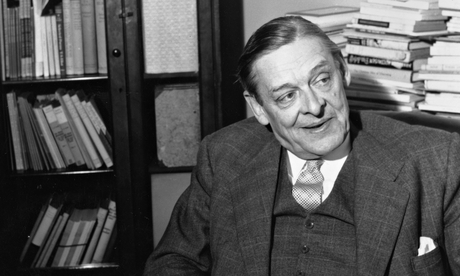
Eliot at his best is one of the greatest of poets, but it is impossible to divorce much of the best of his work from the most despicable or disturbing parts of his life.
We have to accept that art is alchemy, that memories, reading, love and fear fuse together, and are transmuted in the process. The rapist Byron, the whoremonger Rochester and the Stalinist quasi-plagiarist Brecht were contemptible human beings, and yet I love their work, and have been changed and influenced by it often for the better. So it is with Eliot. Even if, in the end, we turn our face away from the particular kind of mystical spirituality that in his last and greatest poems he expresses, it is not because of any thinning of his poetic powers.
It is important to disagree profoundly with George Orwell on this point. In a review of the first three of the Four Quartets, Orwell saw their poetic language as a falling off from the work that he loved – Prufrock, the quatrain poems, The Waste Land – as lacking their tense memorable language and fascinating despair. Because Orwell regarded religious belief as childish and nonsensical, rather than sustainable but wrong, he could not properly respect work to which a sense of the spiritual life is central.
Specifically, he could not take seriously the verbal expressiveness of the meditative passages in the stressed long lines, whose language is devoid of brilliant phrases and steps round and around a shifting point of view. This is a side of Eliot that is harder to love than the sparkling disgust of the early work, or even the lyricism of the sections of the Quartets that counterpoint them, and yet they are as essential to his meaning as the more obviously poetic parts. These are poems of process in which Eliot not only tells us what he thinks but, like a good student, shows us his workings.
If The Waste Land was full of the strains of jazz and ragtime, and moments from Wagner's Tristan und Isolde echoed and inserted, the Four Quartets are musical in a different way. Eliot talked of their relationship with Beethoven's late quartets and it's worth considering what he meant by this. It's not just a question of subject matter – of Beethoven's working through of musical arguments that led him to the passionate yearning of Op 132's hymn of thanksgiving, or the passionate question and affirmation of Op 135's finale. The relationship lies also in structure – in the way Beethoven cast aside the four movements of his earlier quartets for a more arbitrary sequence of movements that expressed his intentions better: sudden fragmentary scherzos that are followed by extended noodling adagios that take heavenly time to come to their thematic point.
For poems that are a public expression of belief, Eliot uses in the Quartets a lot of private and personal references. Each of them refers to a place that mattered to him – Burnt Norton was a garden he had visited with Emily Hale; East Coker the town from which his ancestor had emigrated; the Dry Salvages rocks he had seen during boyhood boating; Little Gidding a site to which he had made pilgrimage in honour of a C17 devotional group there. Love that might have been, continuity with origins, sense of rootedness to place, pilgrimage as a model of spirituality as process – these are all far more than just the religious conclusions that Eliot tries to lead us to.
Where Orwell is wrong is in his assumption that religion and the devotional are not subjects of serious consideration: that once a majority of the population ceased to believe in the immortality of the soul in any deep-seated and rational way our posthumous fate, our concern that there might be one ceased to be worthy of adult attention. We all have regrets, fears and hopes and a need to come to terms with who we once were and who we might be; we can reject all of Eliot's actual beliefs and yet still feel a relationship with the needs those beliefs addressed.
It is important to consider how he got – and how we may get – from yearning to some sort of sense of authenticity. In the end, with all his flaws, he is one of us. "In my end is my beginning"; "we shall not cease from exploration" – he speaks for our concerns, even when he does not convince us of his conclusions.

